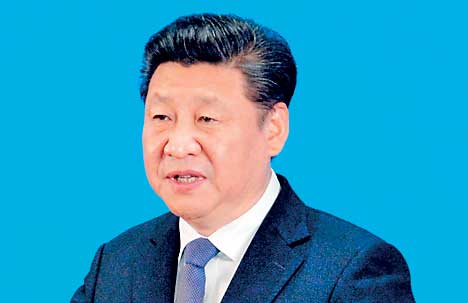Sunday Feb 22, 2026
Sunday Feb 22, 2026
Friday, 29 April 2016 00:00 - - {{hitsCtrl.values.hits}}
Reuters: China will not allow chaos and war to break out on the Korean peninsula, which would be to no one’s advantage, Chinese President Xi Jinping told a group of Asian foreign ministers on Thursday.
North Korea’s drive to develop a nuclear weapons capability, in defiance of U.N. resolutions, has angered China and raised tension in the region.
“As a close neighbour of the peninsula, we will absolutely not permit war or chaos on the peninsula. This situation would not benefit anyone,” Xi said in a speech to a Conference on Interaction and Confidence Building Measures in Asia.
North Korea conducted its fourth nuclear test in January and followed that with tests of various missiles that could deliver such a weapon.
The isolated state is expected to conduct another nuclear test before a rare congress of its ruling party, beginning on May 6, at which young leader Kim Jong Un is expected to try to cement his leadership.
China is North Korea’s sole major ally but it disapproves of its development of nuclear weapons and backed harsh new U.N. sanctions imposed last month.
China has long called for the Korean peninsula to be free of nuclear weapons.
Nearly 30,000 U.S. troops are based in South Korea and the two Koreas are still technically at war after the 1950-53 conflict ended in an armistice, not a treaty.
Xi also told the meeting China would safeguard peace and stability in the South China Sea, while at the same time maintaining its sovereignty and rights there.
China claims almost the entire South China Sea, believed to rich in oil and gas deposits. Brunei, Malaysia, the Philippines, Taiwan and Vietnam also claim parts of the waters, through which about $5 trillion in trade is shipped every year.
China has rattled nerves with its military and construction activities on tiny islands in the disputed waters, including building runways, though it says most of its activity is for civilian purposes.
Chinese officials say the United States is pushing militarization and endangering stability with “freedom of navigation” operations by its military ships and aircraft in the South and East China seas.
The United States says it conducts such patrols across the world in an effort to demonstrate that the international community does not accept restrictions set up by some countries in international waters.
The Conference on Interaction and Confidence Building Measures in Asia involves 26 members, including Russia and many countries from Central Asia and the Middle East. The United States and Japan are among eight observers.